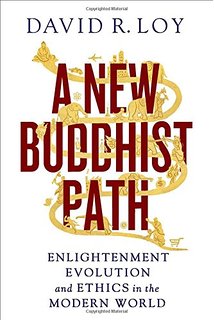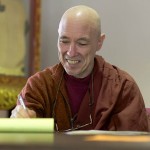Since the age of 3, I have been interested in other peoples. Apparently that was the age when I toddled up to the television, pointed to the evening news, and stated: “I am going to Tokyo.” All throughout my travels and my education I have pursued some understanding about “how the world works,” about human interactions, about how communities navigate a world filled with other communities.
With two people you have a conversation, with three you have a society.
I don’t know the origin of that saying, but it lies at the heart of how I try to understand our world: war, technology, economics… each boils down to politics — not the electoral kind, but the interpersonal kind.
So, in my study of Buddhism, it is natural that I should approach it from a political perspective, especially since so much of our common (Western) understanding of Buddhism seems apolitical: people shaving their heads, retiring to isolated mountain monasteries and renunciating the world. Surely Buddhist political thought cannot simply rely on “social transformation through personal transformation”? Surely they do not believe the way to bring about a more equitable world is for everyone to become Buddhist?
Beliefs such as those have literally caused wars.
I became curious to find out the Buddha said on how society should be structured. The enlightened one had great advice for sickness, old age and death. What advice did he have for the social, economic, and political ills society suffers from?
Buddhist political actors
Even with a limited reading of Buddhism you will encounter the following three basic socio-political actors. The first is the bodhisattva, which in simplified terms is an enlightened person who refuses to enter Nirvana, remaining in this world for the good of others. The second actor is a Wheel-turning Monarch, effectively a “philosopher king” which rules compassionately according to the precepts of Buddhism (Ashoka is the famous example). These first two actors are individualistic, despite their sacrifice for wider society, and not the basis to organize a society around. The final concept is that of the sangha , or Buddhist community. There are many prescriptions on the right activities in the sangha, but it is not a word that describes “society” in the wider sense. None of these concepts satisfy the requirements for a political theory in the modern sense.
Contemporary Buddhist philosopher David Loy points out:
The Buddha lived in Iron Age India, and his society faced a different set of problems: for instance, aggressive monarchies competing to swallow up smaller states. Traditional Buddhism cannot help us decide whether to rein in growth-obsessed capitalism or to replace it with a more socially responsible economic system. We cannot depend on the Buddha to advise us whether a revitalized representative democracy can work well enough or whether we should push for more local, decentralized governance
A new path
The socio-political context in the time of Siddhārtha Gautama was not one conducive to pondering an equitable society. Morality and deliverance were strictly a personal matter in such conflict-ridden, and sometimes oppressive times. But that should not limit us. Buddhism is rich with a 2500 year legacy of philosophy, and Loy in his latest book A New Buddhist Path: Enlightenment, Evolution, and Ethics in the Modern World encourages us to use that legacy to explore new solutions. 
After hearing him on the Wisdom Podcast I picked up the book and was delighted by Loy’s application of Buddhist philosophy. Other than evolution and quantum physics, Loy attempts to apply the theory of the Three Poisons (greed, aggression, and delusion) to wider social issues, and offers a Buddhist critique on economic inequality, environmental disaster, conflict, and other modern social ills. I especially appreciated his critique of consumerism. A sample:
… encouraged by an economic system that conditions us to find the meaning of our lives in never-ending consumption. From a Buddhist perspective, however, consumerism promises a this-worldly salvation that it never quite provides: attractive advertisements are carefully crafted to keep us persuaded that the next thing we buy will make us happy … a consumerist economy exploits our sense of lack, instead of helping us understand and address the root problem. The system generates profits by perpetuating our discontent in a way that aggravates it and leaves us wanting more
In general the book is a pretty systematic attack on the capitalist world, and it is by no means gentle. Loy quotes the famous monk Thich Nhat Hanh:
The American dream has become the world’s nightmare.
Buddhist critiques on society are not new, but as a politico I find them very fascinating. Loy introduces the term “social dukkha.” Dukkha is the Buddhist concept of “suffering”, or the “fundamental unsatisfactoriness and painfulness of mundane life“. Loy extrapolates this concept from individual suffering to the systematized suffering of social structures. Bhikku Bodhi, a famous Western Buddhist scholar describes the basic concept pretty elegantly in a Wisdom podcast. Here is a clip:
[soundcloud url=”https://api.soundcloud.com/tracks/325287833″ params=”color=ff5500&auto_play=false&hide_related=false&show_comments=true&show_user=true&show_reposts=false” width=”100%” height=”166″ iframe=”true” /]

Bhikku Bodhi founded Buddhist Global Relief, a not for profit with a mission to “combat chronic hunger and malnutrition”, and has called out other Buddhists to “stand against suffering”. Beyond the concept of social dukkha he and other engaged Buddhists are introducing the new term to the discourse: bodhisattva-citizen, or “someone who is willing to engage with society to help protect and awaken others.” (Loy uses the term “bodhisattva-activist” in his book).
There is a role for Buddhists to play in modern day politics.
Staying engaged
Simplifying, minimalism, focusing on the experience, cutting off desires and dependencies, developing an internal spiritual practice… All these aspects were very appealing to me as I stood at the beginning of the path. But my activist, news-junkie heart felt fear at the thought of renunciating worldly politics. I can’t give up reading the news! I can’t log out of Twitter! How will I know if #theResistance is working?
Ah, the cries of clinging and attachment of the modern-day infovore! As long as it is in moderation, David Loy shows that one can be an engaged Buddhist. It does not mean merely observing and accepting a very problematic socio-political environment. In fact, “at its best Buddhism offers an alternative approach”, a new way of approaching problems.

